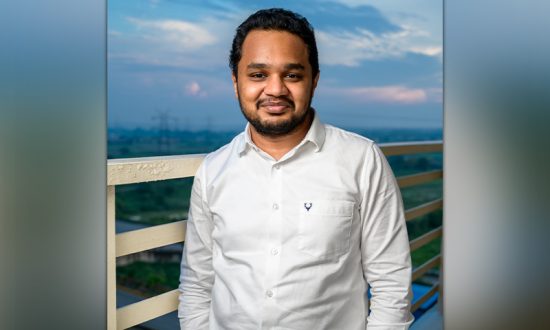Nimith is the Founder of DoctCo, a company that aims to reinvent healthcare in rural areas of India using technology and innovation. DoctCo’s social initiative Swasthya Ghar Tak has provided last-mile connectivity to patients suffering from chronic diseases residing in tier 2 and 3 cities and nearby towns by connecting them remotely with medical experts.
Healthcare has gained unprecedented importance since the Covid-19 pandemic and subsequent waves. India witnessed one of the most fragile healthcare ecosystems with a shortage of medical supplies and oxygen in every state. The impact was more severe in regional areas with no access to basic medical facilities. The pandemic did not spare anyone from the harsh reality of the struggle between life and death. Newborns, senior citizens, and even the healthcare fraternity suffered miserably. While the urban population started understanding the gravity of the situation, rural India was still unaware of the ferocity of the dreadful virus. This was when Healthtech startups came as saviors and paced up to bridge the gap for regional India.
Building The Regional Healthcare Ecosystem
Most of regional India still struggles for primary healthcare facilities. Not just villages, towns beyond Tier-I and Tier-II cities are in a state of despair. Accessibility is the primary hurdle depriving the regional population of basic medical facilities. Healthcare startups have taken path-breaking initiatives in building a robust healthcare ecosystem. The first step in the journey is to make primary and advanced healthcare facilities accessible and affordable to one and all.
New-age Healthtech Solutions
New-age health tech solutions are designed and developed to suit the common man’s medical needs. With the advent of technologies like Artificial Intelligence (AI), the Internet of Medical Things (IoMT), and Machine Learning (ML), the goal of 24*7 last-mile accessibility of medical services to the most remote area is no more a dream. Online consultation with medical practitioners, portable diagnostic devices, multispecialty hospitals has become a reality in no time. The change has helped prompt action to control the disease early and save many lives.
Portable medical devices, live streaming of clinical data, and teleconsultation with doctors have helped patients in far-flung areas. The technology-backed ecosystem can connect patients living in remote towns and villages to surgeons in metropolitan regions. This allows patients to save a lot of costs on travel and stay for pre and post-surgery care.
The Beginning of a New Journey
Though the thought of providing medical facilities to one and all was very noble, the journey faced many challenges. The regional healthcare ecosystem had to be built considering the low bandwidth environment and non-tech-savvy population. Teams worked at the ground level for collating data and understanding the need of the hour. Doctors and nurses visited towns and villages to monitor the pandemic situation, educate the necessity of maintaining hygiene, vaccination, and monitoring their health. The biggest challenge was to convince the resilient rural population about the advantages and convenience of adapting to the new-age healthcare ecosystem. Teams were set up to educate and demonstrate the benefits to the resilient public that preferred age-old systems.
Teams found that transportation was a significant challenge for the rural public. Many did not have any means to travel to the clinics or hospitals to get themselves checked. To help them with last-mile accessibility, start-ups introduced mobile clinics with hi-tech telemedicine equipment. They transmitted real-time clinical data to doctors to help them take prompt action. This helped detect disease at an early stage and reduce the mortality rate.
The leading cause of resistance among the rural population is affordability. They have a perception that all the diagnostic procedures and medication are very costly. Most of the Indian population still stands uninsured; this makes it all the more important to make primary and critical care affordable on a PAN India level. Healthtech start-ups have considered this crucial factor and are working towards making healthcare services affordable in every part of the country.
Scaling up the Regional Healthcare Ecosystem
The regional healthcare ecosystem is at a very nascent stage. India needs to scale up the system to serve millions in various parts of the country. Healthtech start-ups have received tremendous support from the Government of India by introducing various schemes and fast-tracking the approval processes.
Healthtech startups started by testing prototypes and various models in selected pockets of the country. Many achieved success by improvising with experience and using trial and error techniques. The next step is to scale up the reach and capacity to meet the ultimate goal of medical care for all. This requires a generous amount of funds.
Healthtech startups raised funds by partnering with venture capitalists and private equity investors who believed in their efforts. The support from various state government bodies, NGOs, and relief funds has helped startups to scale up and work on cost efficiency.
Contribution of Healthtech in GDP
India is among the countries with the least expenditure on healthcare as a share of GDP. The Budget Estimate 2020-2021 pegs the government expenditure towards healthcare at a meager 1.8% and expects to reach 3% in the next five years. India will still stand among countries with the least government spending on healthcare. Also, being a densely populated country, these numbers do not match the healthcare requirements of the citizens.
The pandemic has been a trigger for the healthcare system and has started gaining importance as other sectors in the economy. The next five years are crucial for the healthcare sector. Public-private partnerships can be a great way to reduce the burden on the government to provide technology-backed, affordable healthcare solutions. The focus on regional penetration can change the dynamics of the healthcare ecosystem.
Healthtech startups have tremendous scope and can build a robust healthcare ecosystem. Just like fintech startups have turned out to be unicorns and changed the Indian economy’s pace, Healthtech startups can change the landscape of the country’s healthcare ecosystem.


